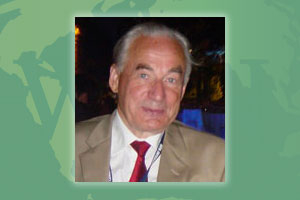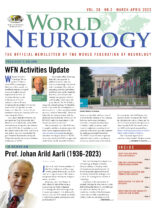By Nils Erik Gilhus, Ole-Bjørn Tysnes, and Christian A. Vedeler
 Johan A. Aarli was an inspiring and highly respected neurologist with a worldwide influence. Sadly, he died March 24, 2023, at age of 86 years after a long illness. He made a huge professional impact locally, nationally, and globally. Prof. Aarli was a successful president of the World Federation of Neurology 2005-2009, and a general secretary of the European Association of Neurological Societies 2003-2005.
Johan A. Aarli was an inspiring and highly respected neurologist with a worldwide influence. Sadly, he died March 24, 2023, at age of 86 years after a long illness. He made a huge professional impact locally, nationally, and globally. Prof. Aarli was a successful president of the World Federation of Neurology 2005-2009, and a general secretary of the European Association of Neurological Societies 2003-2005.
Prof. Aarli’s aim throughout his professional career was to improve the treatment for patients with disorders in the brain and nervous system. His tools were teaching, research, leadership, and organization of neurologists and neuroservices. He combined clinical education and improvement, research, and innovation. As a WFN president, he was famous for his African initiative. He regarded better services for patients in poor countries as the major challenge for WFN. Furthermore, he was instrumental in building a true global alliance in neurology and neuromedicine with activities on all continents.
Prof. Aarli was the head of the department of neurology at Haukeland University Hospital for nearly 30 years, combined with a professorship at University of Bergen, until he retired in 2006. He built a modern and expansive department with specialized units for neurophysiology, neurorehabilitation, and occupational neurology, and with systematic multiprofessional treatment for well-defined neurological patient groups, such as ALS, epilepsy, multiple sclerosis, and stroke.
A main aim for Prof. Aarli was to combine clinical practice with research and education. His personal research focus was clinical neuroimmunology, and myasthenia gravis in particular. He contributed to the understanding of autoimmune disease mechanisms, and he helped in developing the field internationally through his widely distributed textbook from 1987. His research policy was to combine detailed clinical information with biomarker data from laboratory investigations. As a professor, department head, and university dean, he inspired and supported research in clinical neuroscience relevant for all neurological patient groups, including the development of clinical registries and biobanks.
His ability to lead, to teach, and to build networks stemmed from his sharp intellect combined with his friendly interest in people. His short- and long-term strategies were successful because he worked so well together with colleagues and patients, and with administrators and politicians. He appreciated people, and they appreciated him.
Prof. Aarli was born in Kvinesdal, a small village valley in Southern Norway. Together with his father, he wrote the local history of that valley. He was interested in history and literature, and he was co-founder of the Norwegian Neuroliterature Club. He was open-minded, optimistic, and honorable. He listened and discussed, was a true democrat, but he combined this with an ability to make decisions and see projects through.
We miss Johan A. Aarli in Bergen and Norway, but his impact is still here. We are sure that this is true also for many of his friends and activities globally. Our warm condolences go to his wife, his five children, and a big family. •
From the department of neurology at the Haukeland University Hospital and University of Bergen in Bergen, Norway.
